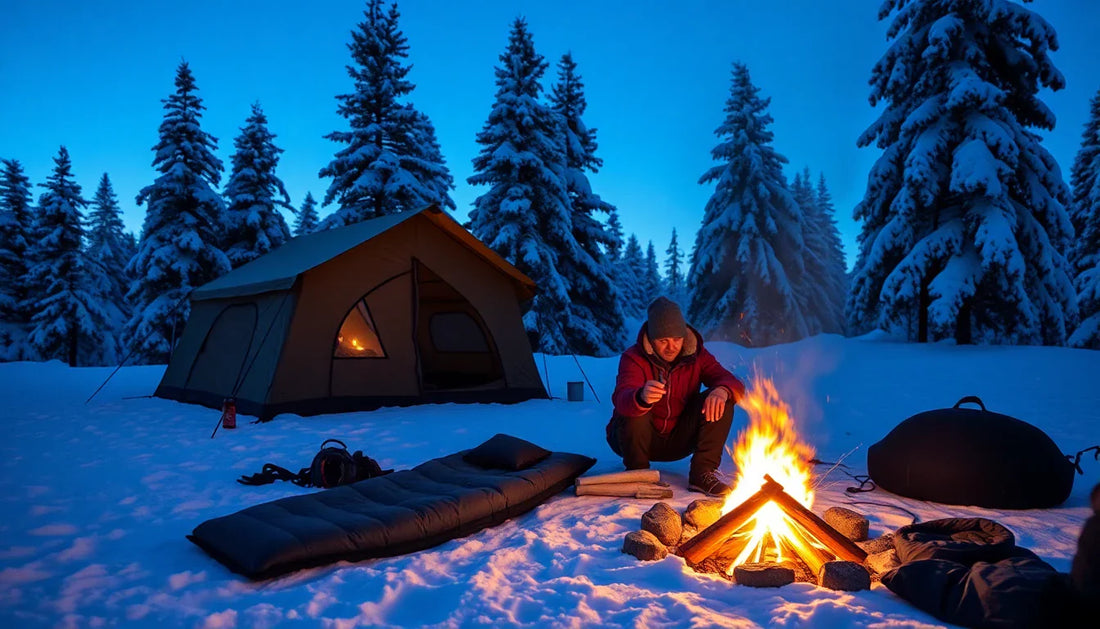
Cold Weather Camping: How to Stay Warm and Safe in Winter Conditions
Share
As the temperatures drop and the snow begins to fall, the allure of winter camping becomes increasingly tempting for outdoor enthusiasts. The serene beauty of a snow-covered landscape, the crisp, invigorating air, and the sense of adventure that comes with braving the elements can be truly captivating. However, venturing into the great outdoors during the colder months requires a different set of skills and preparation to ensure a safe and comfortable experience.
In this blog post, we'll explore the essential strategies and gear needed to stay warm and secure while camping in winter conditions. Whether you're a seasoned winter camper or a newcomer to the sport, these tips will help you make the most of your cold-weather adventures.
Essential Winter Camping Gear
Proper gear is the foundation for a successful and enjoyable winter camping trip. The key to staying warm lies in the right combination of insulated sleeping bags, layered clothing, and specialized equipment.
Sleeping Bags and Pads
Choosing the right sleeping bag is crucial for staying warm through the night. Look for bags rated for temperatures well below the expected lows of your camping location. Down-filled sleeping bags are an excellent choice for their exceptional warmth-to-weight ratio, but synthetic options can also perform well in wet conditions. Pair your sleeping bag with a high-R-value insulated sleeping pad to prevent heat loss from the ground.
Layered Clothing
Dressing in layers is the best strategy for regulating your body temperature in cold weather. Start with a base layer of moisture-wicking fabrics like merino wool or synthetic materials, followed by insulating mid-layers and a weatherproof outer shell. Don't forget to protect your extremities with warm socks, gloves, and a well-insulated hat.
Essential Equipment
In addition to your sleeping system and clothing, you'll need other essential winter camping gear, such as a sturdy, four-season tent, a reliable stove and fuel, and a means of starting a campfire. Trekking poles, snowshoes, or skis may also be necessary, depending on the terrain and snow conditions.
Shelter and Campsite Selection
Choosing the right shelter and campsite can make a significant difference in your winter camping experience.
Selecting the Proper Tent
When it comes to winter camping, a four-season tent is a must. These specialized tents are designed to withstand heavy snow loads, strong winds, and extreme temperatures. Look for features like a sturdy, weatherproof construction, ample insulation, and vestibules for storing gear.
Campsite Considerations
The location of your campsite can greatly impact your comfort and safety. Seek out sheltered areas that are protected from the wind, such as forested areas or natural windbreaks. Avoid low-lying areas that may accumulate cold air or be prone to snow drifts. If possible, choose a site with access to a reliable water source and natural fuel for a campfire.
Staying Warm Techniques
Maintaining your body heat is crucial in cold weather camping. Employing effective strategies can make the difference between a cozy, comfortable night and a miserable, shivering experience.
Body Heat Management
Proper body heat management is essential. Avoid sweating, which can lead to rapid cooling, by regulating your activity level and adjusting your layers as needed. When resting or sleeping, use a hot water bottle or chemical hand warmers to provide additional heat.
Layering and Insulation
Layering your clothing is key to staying warm. Start with a base layer of moisture-wicking fabrics, followed by insulating mid-layers and a weatherproof outer shell. Don't forget to protect your head, hands, and feet, as these areas are prone to rapid heat loss.
Nutrition and Hydration
Maintaining proper nutrition and hydration is crucial in cold weather. Consume high-calorie, nutrient-dense foods to fuel your body and keep your metabolism running efficiently. Stay hydrated by drinking warm liquids and avoiding alcohol, which can impair your body's ability to regulate temperature.
Safety Practices
Camping in winter conditions requires heightened safety awareness and preparedness. Familiarize yourself with the signs and symptoms of hypothermia and frostbite, and know how to respond in an emergency.
Recognizing and Treating Hypothermia and Frostbite
Hypothermia, the dangerous lowering of body temperature, and frostbite, the freezing of exposed skin, are serious risks in cold weather camping. Learn to recognize the early warning signs and have a plan in place for immediate treatment.
Emergency Preparedness
Ensure that you have the necessary emergency gear, such as a first-aid kit, a reliable communication device, and a means of starting a fire. Familiarize yourself with navigation techniques and have a plan for contacting rescue services if needed.
Campfire Safety
Campfires can provide essential warmth and a sense of comfort in the winter, but they also require special precautions. Follow local regulations, clear a safe area, and never leave a fire unattended. Ensure that you have the proper equipment and fuel to maintain a controlled, safe fire.
Beginner Tips for Winter Camping
If you're new to winter camping, the prospect of braving the cold can be daunting. Here are some tips to help you get started:
Gradual Skill Development
Start with shorter, less challenging trips to build your confidence and experience. Gradually work your way up to longer, more remote winter camping adventures as your skills and gear improve.
Practice and Training
Take the time to practice setting up your winter camping gear, practicing essential skills like fire-starting, and familiarizing yourself with the unique challenges of cold-weather camping.
Seek Guidance and Resources
Don't hesitate to seek out experienced winter campers, attend workshops, or consult online resources to learn from those who have been there before. Their knowledge and advice can be invaluable.
Conclusion
Embracing the beauty and adventure of winter camping requires careful preparation, the right gear, and a deep respect for the challenges of the cold. By following the strategies and techniques outlined in this blog post, you'll be well on your way to enjoying safe, comfortable, and unforgettable cold-weather camping experiences.
So bundle up, venture out, and let the winter wonderland captivate your senses. With the proper knowledge and equipment, you can confidently explore the serene landscapes and revel in the unique joys of camping in the colder months.
